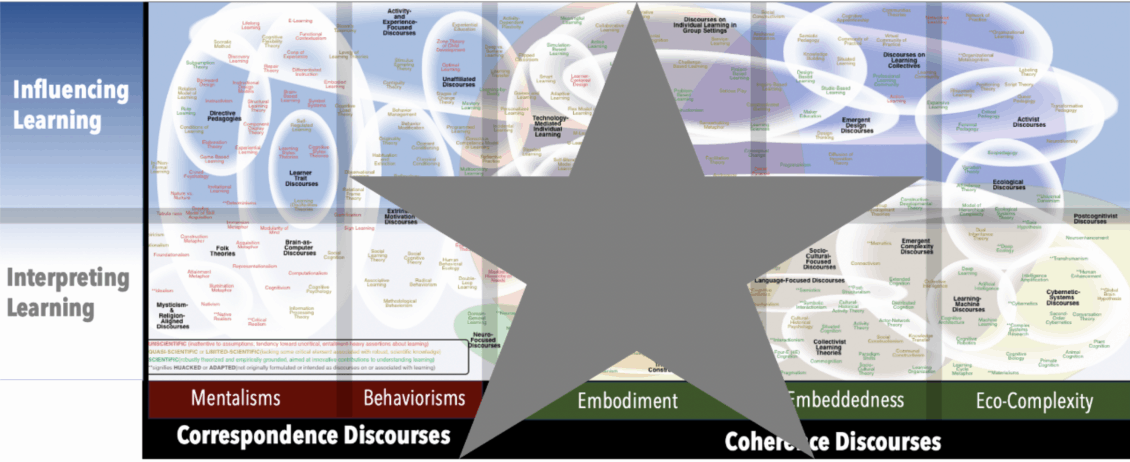Focus
Interpreting learning in terms of connections and networksPrincipal Metaphors
- Knowledge is … structure arising from associations
- Knowing is … activating associational web
- Learner is … association maker (individual)
- Learning is … making associations
- Teaching is … signaller/triggerer/maker/deliverer of associations
Originated
1600sSynopsis
As a metaphor for learning, the Association-Making Metaphor has to do with linking – experiences, interpretations, agents, systems, and so on. As might be expected from the range of phenomena just listed, the metaphor is invoked in multiple ways, from the more static and mechanical (e.g., Behaviorisms' analogy to making connections on a telephone switchboard) to the more dynamic and organic (e.g., notions of ever-elaborated webs of meaning across most Embodiment Discourses). Formalizations of the metaphor include:- Association Psychology – an approach to Psychology developed around the assumption that learning is a matter or forming associations between experience and ideas
- Associationism is more a principle than a theory or a discourse. It is articulated in many ways, but common threads include (1) an assumption that experience is the principal shaper of one’s knowing, (2) an assertion that human learning is mainly about making associations among experiences, (3) a supposition that activating a thought will likely activate associated thoughts, and (4) an acceptance human cognition is largely non-logical. Some of the core principles of Associationism were articulated long ago:
- Laws of Association (Aristotle, 300s BCE) – Experiencing one object/event will trigger recollections of similar objects/events, contrasting objects/events, and/or contiguous objects/events (i.e., ones that were experienced at the same time)
- Law of Frequency (Aristotle, 300s BCE) – The more frequently events happen together, the stronger the connection between them.
- Mental Mechanics (Mental Physics) (James Mill, 1810s) – the suggestion that all complex thoughts are merely assemblages of simpler thoughts. The idea is ancient, and it continues in force in many discourses on learning that rely on the Association-Making Metaphor.
- Associative Psychology – a disputed (and, therefore, not especially common) phrase that is sometimes used as a synonym to Behaviorisms and other times used more generally as a synonym to Association Psychology (see above)
- Hypothesis Theory (Martin Levine, 1960s) – the suggestion that learning – which is assumed to be association-making – involves generating and testing series of hypotheses to distinguish what is salient and what is irrelevant among presented stimuli
- Object Learning – establishing an association between two aspects of the same object
- Relational Learning – identifying experiences or objects based on their relationships to one another, rather than according to their individual properties
Commentary
The Association-Making metaphor is evident across a great many discourses, as disparate as Empiricism, Representationalism, Behaviorisms, Radical Constructivism, Connectionism (of Cognitive Science), and Psychoanalytic Theories – to mention just a few. This popularity of application is perhaps better interpreted as a broad recognition of the importance of experience in learning, rather than an indication of profound insight.Authors and/or Prominent Influences
DiffuseStatus as a Theory of Learning/Teaching
As indicated above, the Association-Making Metaphor is invoked within both Correspondence Discourses and Coherence Discourses – that is, it appears along the entirety of our map’s horizontal axis. That said, with regard to our vertical axis, the Association-Making Metaphor appears to be more integral to discourses on interpreting learning (i.e., the lower region) than to more teaching-oriented discourses on influencing learning – although, importantly, the metaphor is certainly well represented in the top region of the map.Status as a Scientific Theory
As it is more a principle than a theory or discourse, efforts to assess the scientific status of the Association-Making Metaphor only make sense within the discourses in which it is invoked – that is, and with some irony, in terms of the ways it is used in association with other principles.Subdiscourses:
- Association Psychology
- Associationism
- Associative Psychology
- Hypothesis Theory
- Law of Frequency
- Laws of Association
- Mental Mechanics (Mental Physics)
- Object Learning
- Relational Learning
Map Location

Please cite this article as:
Davis, B., & Francis, K. (2024). “Association-Making Metaphor” in Discourses on Learning in Education. https://learningdiscourses.com.
⇦ Back to Map
⇦ Back to List
